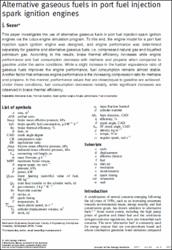Alternative gaseous fuels in port fuel injection spark ignition engines
Erişim
info:eu-repo/semantics/closedAccessTarih
2011Erişim
info:eu-repo/semantics/closedAccessÜst veri
Tüm öğe kaydını gösterÖzet
This paper investigates the use of alternative gaseous fuels in port fuel injection spark ignition engines via the Lotus engine simulation program. To this end, the engine model for a port fuel injection spark ignition engine was designed, and engine performance was determined separately for gasoline and alternative gaseous fuels, i.e. compressed natural gas and liquefied petroleum gas. According to the results, brake thermal efficiency increases while engine performance and fuel consumption decrease with methane and propane when compared to gasoline under the same conditions. While a slight increase in the fuel/air equivalence ratio of gaseous fuels improves the engine performance, fuel consumption remains almost stable. Another factor that enhances engine performance is the increasing compression ratio for methane and propane. In this manner, performance values that are closer/equal to gasoline are achieved. Under these conditions, fuel consumption decreases notably, while significant increases are observed in brake thermal efficiency.


















